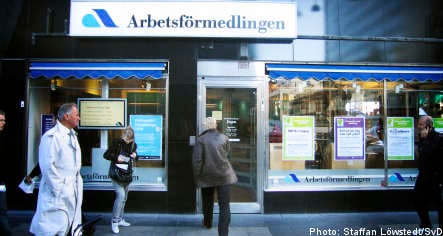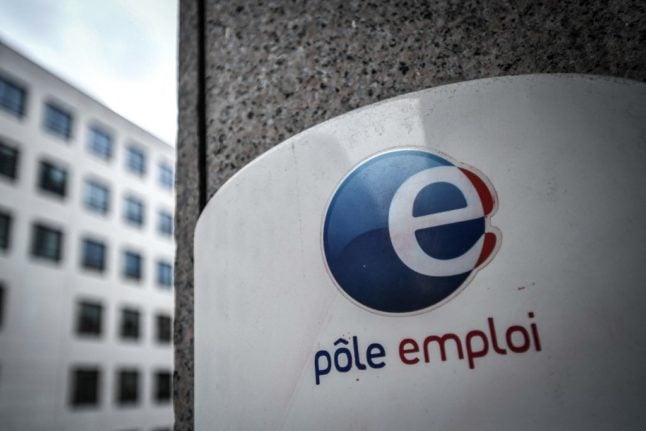Supporting yourself when you are unemployed is never a barrel of fun, but it is in many respects easier in Sweden than in many other countries. You are entitled to fairly generous payments, designed to ensure that people on average incomes are able to pay the bills while looking for a new job.
Most working Swedes are members of an unemployment insurance fund (A-kassa). This entitles them to up to 80 percent of their former salaries for their first 200 working days of unemployment. The following 100 days (so up to a year after becoming unemployed), are paid at 70 percent of previous income. Payments are capped at 680 kronor per day, though, so only people on relatively low incomes will receive 80 percent of their previous earnings.
Despite being funded largely by tax money, the Swedish unemployment insurance system is administered primarily by private organizations – principally trade unions. You don’t have to be a Swedish citizen to join – all you need is a standard Swedish resident’s permit and personal number.
Union-run schemes are open only to people who work in the relevant trades or professions (for instance, the Metall union’s scheme is open to people working in heavy industry; the teacher’s union’s scheme – Lärarförbundets Arbetslöshetskassa – is open to teachers). You don’t have to be a member of the relevant union to join the unemployment scheme, but some schemes offer discounts to union members.
There are a couple of schemes that cater for a wider range of people:
The AEA (Akademikernas Erkända Arbetslöshetskassa) is open to anyone with a degree. This is defined as anyone with 180 points gained through academic study in the European Credit Transfer System or 120 points in the old Swedish system. For people who have studied outside of Sweden, it usually means having gained a Bachelors degree.
Alfa Kassan is open to anyone, regardless of their job or academic qualifications.
The schemes are funded partly by the state (through payroll tax paid by employers) and partly out of fees paid by members.
The fees paid by members vary considerably from scheme to scheme, and broadly reflect the risk of unemployment in the sectors covered. The cheapest scheme is the Finance and Insurance Industries’ Scheme (Finans- och försäkringsbranschens) at 118 kronor per month for non-union members, followed by AEA at 150 kronor. The most expensive schemes are those covering musicians and the fishing industry. The fees in these schemes are 433 kronor per month for non-union members.
You can download a full list of the various schemes’ fees at the end of this article (it’s in Swedish, but fairly easy to understand – the first column is for people who are not union members).
To be entitled to full unemployment insurance payouts you must have been a member of a scheme and in regular work for at least a year before becoming unemployed.
If you have not joined a scheme, or have not been a member for a full year before becoming unemployed, you are entitled to a basic payment of 320 kronor per day. You are only entitled to this if you have worked full time for the twelve months prior to applying for the money. If you have worked half-time you are entitled to 50 percent of the full amount, meaning you would get 160 kronor per day.
If you’re not a scheme member, your payments will be made by Alfa Kassan, and you should contact them if you become unemployed. If you have been a member of another scheme for under a year, so do not qualify for the full payouts, your basic payouts will still be made by that scheme, not by Alfa Kassan.
Whichever kind of unemployment insurance you are receiving, an upside is that it is not means-tested. You can have a Bentley in the drive of your chateau and ten million in the bank, and you will still be entitled to payments if you become unemployed:
“The point is that it is not a benefit and it is not means-tested. It is a taxable income that is used as a basis for your state pension,” says Gertrud Hedenström-Eriksson of SO, an organization coordinating all Sweden’s unemployment insurance funds.
They might not be means-tested, but insurance schemes come with a number of strings attached. In order to qualify for the payments you must be physically able to work at least three hours a day and 17 days a week. You must also be actively seeking and be prepared to take a suitable job and have registered at the state job centre (Arbetsförmedlingen). Job centre staff can demand that you seek work outside your immediate home area in order to qualify for payouts.
Also worth bearing in mind is that unemployment insurance payments are taxed like any other income. Additionally, you will still have to pay insurance scheme fees while out of work, although you will be given a discount.
People who run or own a company must wind up the company, or at least suspend all activity, in order to qualify for unemployment insurance payments. Using the unemployment schemes to cover a downturn in business is not allowed, meaning many people who run small companies opt to remain outside the schemes altogether.
If you are out of work and not covered by any form of unemployment insurance you can receive so-called social benefits. These are administered by local municipalities and are means-tested to cover the basic cost of living.
Do you have a question about the practicalities of living in Sweden? Then drop us a line at [email protected].



 Please whitelist us to continue reading.
Please whitelist us to continue reading.